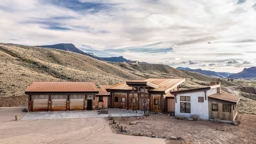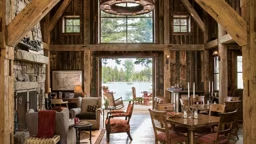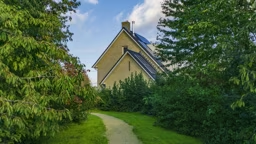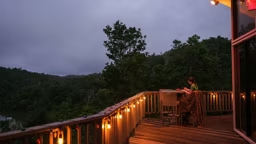If you’re like most cabin owners, running out of hot water happens more often than you’d like. Everyone comes in off the trails or off the lake and hits the showers. Soon the hot water is gone and you have to wait to take your shower.
Are you doomed to hot water shortages forever? Not necessarily. Thanks to the emergence of tankless water heaters, you can have an endless supply of hot water, whenever you need it.
Tankless water heaters (also called demand water heaters) have been common in other countries for decades, but only recently have Americans begun to realize their value. This style of heater, which is considerably smaller than a traditional hot water tank, makes good sense for vacation homes where space is often at a premium.
And it may be a good choice for those cabin owners who use their places mostly on weekends. Why heat water all week in a conventional heater in preparation for your Friday night arrival?
While a tankless heater can be used for primary water heating, it can also serve as a booster for additional hot water needs — like for a patio hot tub!
How Do They Work?
A conventional water heater warms and stores a certain amount of water at a time. But a tankless unit heats cold water as it flows through the unit. You can have hot water in as little as 5 seconds.
The unit heats continuously for as long as you have your hot water faucet turned on, and then powers down when you turn the faucet off.
Tankless water heaters are usually installed close to where hot water is needed such as a faucet, shower or washing machine. Smaller units can be recessed into walls, under cabinetry or in closets. Each unit is limited in the amount of hot water it can produce per minute — so in order to serve more than one water outlet at a time, you may need to install multiple units.
Electric or Gas?
Electric tankless water heaters have a lower flow rate capacity than gas; but gas units usually require pilot lights — so they can consume more energy than electric models.
If you’re thinking of retrofitting a cabin with a gas unit, first read the specs of the particular unit and talk to a professional installer. You’ll need to know whether the unit requires a stainless-steel exhaust pipe for venting and what size gas line is required. Both of these scenarios can add expense to your conversion project.
Energy Savings
Tankless water heaters can save up to 50 percent on hot water energy costs. Actual savings depends on how much hot water you use and whether your unit is electric or gas. According to the U.S. Dept. of Energy, homes that use a modest 41 gallons or less of hot water daily could be 24 to 34 percent more energy efficient with a tankless unit versus a conventional heater. However, if you go through considerably more hot water — around 86 gallons or more — the tankless unit is still more efficient than conventional systems, but only by 8 to 14 percent.
To help you gauge your cabin’s water use, consider: a typical half-full bath is 20 to 25 gallons, a dishwasher uses 9 to 13 gallons, showers flow out at a rate of 2.5 to 3 gallons per minute, and a load of laundry can use anywhere from 9 to 30 gallons.
Of course, the real savings (and convenience) for cabin owners might be in only heating water when you are actually at the cabin.
Need to Know
Tankless water heaters do cost more up front, anywhere from 50 to 200 percent more than a storage water heater. Whereas a conventional unit might cost $200, a tankless unit might cost $300 to $600. But they last longer. Typically, the tankless lifespan is 20 years versus a storage water heater’s average of 10 to 15 years.
Manufacturers recommend that you hire a qualified plumber to properly size and install the unit(s). While parts can be easily replaced, one Upper Midwest plumber who works on second homes said that some parts are still fairly hard to get — meaning if your unit breaks down it can take up to a week to get replacement parts.
Overall, tankless water heaters are an effective and efficient way to provide continuous hot water instantly, even when you’ve just walked in the door after months away. And a properly-sized tankless water heater can supply more than sufficient hot water to wash off all of the fun from your day at the cabin — and save you money in the process.
Britta Reque-Dragicevic enjoys a ridiculously long, hot shower after a day’s work as a freelance writer.










